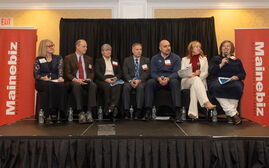
On the Record: Catching up with 2022 Mainebiz Business Leaders of the Year
A year after Mainebiz honored five individuals as our 2022 Business Leaders of the Year, we checked in to find out what they’re up to now.
Don Oakes, Sea Bags CEO

MB: Last year you mentioned plans to double output in the next few years. Is that still a goal, and if so, what steps have you taken to make that happen?
DO: We are still working towards our plan of doubling our production output. To accomplish that, we have four components that we are addressing: Space, material, equipment and people. We made significant progress on three out of four last year by acquiring the warehouse in South Portland where we had been leasing and expanding our footprint significantly; increasing our sail acquisition staff that sources the used sails we need from all over the country; and purchasing additional manufacturing equipment involved in our cut and sew operations. However, we continued to struggle to find sufficient numbers of people to staff our manufacturing operations throughout 2022, and this is our biggest constraint to growth.
MB: What impact has expanding employee benefits had on hiring and retention?
DO: Over the past few months, we have started to see a turnaround in hiring and have had more success at bringing on production folks in the last four to six weeks than at any other time. People comment that they are pleased to learn about the comprehensive and competitive benefits package we offer and have been quite delighted to learn about our new Diversity Day. These benefits extend to our existing staff as well, and we certainly hope that offering competitive, ever-increasing benefits contributes to increased satisfaction and retention.
Amber Lambke, Maine Grains co-founder and CEO

MB: What’s the grain price and supply situation this year, and what steps are you taking to grow your network of growers?
AL: Raw material pricing for organic grains and dry beans are up this year as farmers face supply chain and fuel cost increases in their operations. There is a plentiful supply of grains with good yields from recent summers and farmers in the Northeast are scaling to meet growing demand for organic grains. The number of farms that we purchase from grows by one to two new farms each year.
MB: Where are you at with the planned redevelopment of the property adjacent to Maine Grains, and what’s next?
AL: Due to skyrocketing construction costs through COVID that have not come down, the redevelopment of the property adjacent to Maine Grains was broken into two phases, a Phase 1 building that meets Maine Grains immediate expansion needs, with a Phase 2 building that helps to solve the need for retail space and downtown housing. The Phase 1 building has been designed and we are working with firms in Maine that can help us build the right building at the right price. A problem that many rural communities face: New construction costs more than a building will appraise for as soon as it is built. Thus, we are working hard now to fill financing gaps with grants and investor engagement so that we can break ground.
Nathan Szanton, Szanton Co. president

MB: What new projects are you most excited about, and why?
NS: Two projects we’re working on that I’m excited about are Dougherty Commons in Portland, and White Rock Terrace in Cumberland. Dougherty involves master planning a site right next to the Dougherty Fields Complex, between Douglass and St. James streets, just off the Peninsula. It’s the site of the former West School, which the city of Portland decommissioned and demolished. We’re co-developing the site with Maine Cooperative Development Partners, which is building 58 co-op apartments — in other words, apartments where the renters are also the owners. White Rock Terrace will be a 55-unit apartment building on a hill in a wooded area just off U.S. Route 1 in Cumberland. It will be set aside for households headed by someone aged 55 and over.
MB: Last year you talked about your heart and soul being in affordable housing. How do you stay motivated when it continues to be such a big challenge in Maine?
NS: It’s easy to stay motivated when articles and editorials appear every week in the paper spotlighting Maine’s shortage of housing units, and discussing ways that we can overcome this crisis of underproduction.
Julie Butcher Pezzino, Children’s Museum & Theatre of Maine executive director

MB: How was attendance in 2022 and what exhibits are the most popular so far? Any surprises?
JBP: Our attendance at the beginning of 2022 was limited due to COVID safety measures, but we were thrilled to rebound from these restrictions in the summer and record a blockbuster June, July and August. It’s hard to identify a favorite exhibit because every visitor has different interests. There is something for everyone, and every visit offers children and their caregivers a different experience, particularly when paired with our menu of programming, workshops and afterschool experiences tailored to multiple ages and interests.
MB: What’s the current fundraising climate like for your institution and for museums more generally?
JBP: The fundraising climate is challenging for museums and nonprofits in general given inflation and other factors, but our funders remain incredibly strong and supportive. Membership at the Museum & Theatre continues to climb and exceed our expectations, leading us to believe that more families are seeking safe, enriching educational resources for their children.
Mark Swann, Preble Street executive director

MB: What progress have you made on plans to expand your work in health services?
MS: Since we spoke last year, Preble Street opened Elena’s Way, a Preble Street Wellness Shelter, providing warmth, safety and intensive services for up to 40 people of all genders experiencing homelessness and complex health and behavioral health needs. We also partnered with Greater Portland Health and Maine Medical Center to create Maine’s first recuperative care program to bridge a critical gap in healthcare services for our neighbors experiencing homelessness.
MB: How has your work as an anti-poverty agency evolved in the past year?
MS: Thanks to the support of Gov. Janet Mills, Speaker Rachel Talbot Ross, state Rep. Drew Gattine (D-Westbrook) and others, we’re seeing real momentum for site-based Housing First programs in Maine. Site-based Housing First provides 24-hour supportive services for people experiencing homelessness to maximize housing stability and prevent returns to homelessness. From our experiences managing three of these sites with Avesta Housing, this approach can work in rural and urban communities across Maine and is the solution to chronic homelessness in our state. We’re also taking a big step forward on our vision for ending hunger in Maine. Since 2020, our Food Programs staff has been operating at higher levels than ever before, making 2,000 individual meals daily. When the Preble Street Food Security Hub is fully realized, Preble Street will be able to create up to 10,000 hot, nutritious meals per day and distribute them across Maine thanks to strong partners like Good Shepherd Food Bank.












0 Comments